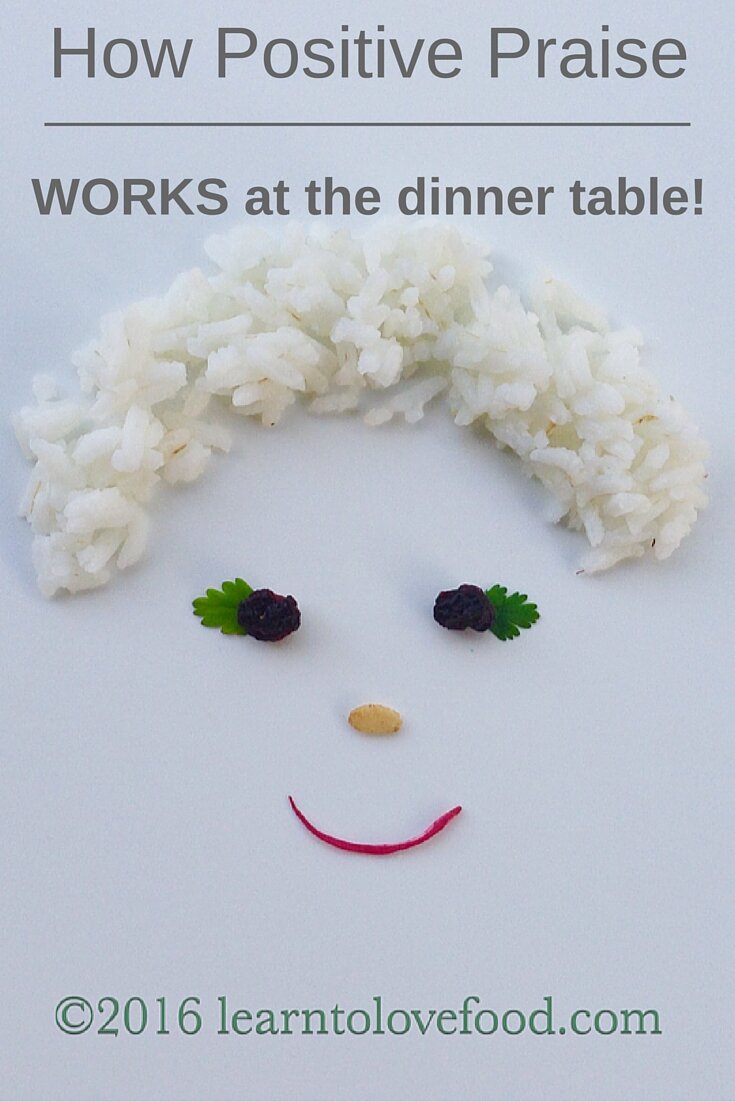Thursday Tips: How Positive Praise Works At Mealtimes!
 Positive praise is attention. Attention makes us feel connected, which we need and crave as human beings. We want to be seen, heard and acknowledged. Kids especially want the kind of acknowledgement attention brings and, often, negative attention is better than no attention!
The cardinal rule of behavior is that we'll get more of whatever behaviors we pay attention to. So how do we get more of the behaviors we want? We give them attention! We find those little things we want to see more of and rather than taking them for granted we shower them with positive praise. "I love how you're sitting right now!" "Thank you for waiting so patiently!" "It is so helpful when you____!" Attention makes kids want to do something again. So, it just makes sense that we get more positive behaviors when we focus on the positive and give them attention!The flip side of this is negative attention, which can't be completely avoided. We do have to tell kids when something's not safe, or they need to make a different choice. But if this is the majority of the attention they're getting, they may do something again, just to get the attention. Or, if one child's good behavior is getting ignored because another's bad behavior is getting all the attention, they may be tempted to act out just to get attention, too! This is where it's so important to pick your battles.If it's possible to ignore something you don't want to see and praise the thing that's happening that you do want to see again, you could extinguish the behavior you don't want to see by simply ignoring it. Amazing! By not giving a behavior attention we can take away the whole reason a child was doing it in the first place!We don't necessarily realize it, but we often give kids lots of attention for not eating! We want them to eat so badly that we bargain, cajole, wheel and deal to get just a few more bites in. But that all gives lots of attention to being 'picky'. It actually reinforces picky eating!It can feel counterintuitive, but what if you ignored that 'picky' behavior instead? What if you responded simply with, "ok, you don't have to eat it," then, maybe 30 seconds later praised some behavior you want to see more of, like how nicely your child is sitting at the table or how they used their fork or napkin or anything. Just noticing how much attention we give to food refusal can be a huge eye-opener!Try it out--maybe during a relatively calm playtime (like food play) rather than an emotionally charged time (like mealtimes) at first. Then, when you've seen your child respond to positive praise, try ignoring the behaviors you don't want to see anymore and finding something to praise during challenging times. I'd love to hear how it goes or if this strategy is already working for you!Good luck and happy food play!
Positive praise is attention. Attention makes us feel connected, which we need and crave as human beings. We want to be seen, heard and acknowledged. Kids especially want the kind of acknowledgement attention brings and, often, negative attention is better than no attention!
The cardinal rule of behavior is that we'll get more of whatever behaviors we pay attention to. So how do we get more of the behaviors we want? We give them attention! We find those little things we want to see more of and rather than taking them for granted we shower them with positive praise. "I love how you're sitting right now!" "Thank you for waiting so patiently!" "It is so helpful when you____!" Attention makes kids want to do something again. So, it just makes sense that we get more positive behaviors when we focus on the positive and give them attention!The flip side of this is negative attention, which can't be completely avoided. We do have to tell kids when something's not safe, or they need to make a different choice. But if this is the majority of the attention they're getting, they may do something again, just to get the attention. Or, if one child's good behavior is getting ignored because another's bad behavior is getting all the attention, they may be tempted to act out just to get attention, too! This is where it's so important to pick your battles.If it's possible to ignore something you don't want to see and praise the thing that's happening that you do want to see again, you could extinguish the behavior you don't want to see by simply ignoring it. Amazing! By not giving a behavior attention we can take away the whole reason a child was doing it in the first place!We don't necessarily realize it, but we often give kids lots of attention for not eating! We want them to eat so badly that we bargain, cajole, wheel and deal to get just a few more bites in. But that all gives lots of attention to being 'picky'. It actually reinforces picky eating!It can feel counterintuitive, but what if you ignored that 'picky' behavior instead? What if you responded simply with, "ok, you don't have to eat it," then, maybe 30 seconds later praised some behavior you want to see more of, like how nicely your child is sitting at the table or how they used their fork or napkin or anything. Just noticing how much attention we give to food refusal can be a huge eye-opener!Try it out--maybe during a relatively calm playtime (like food play) rather than an emotionally charged time (like mealtimes) at first. Then, when you've seen your child respond to positive praise, try ignoring the behaviors you don't want to see anymore and finding something to praise during challenging times. I'd love to hear how it goes or if this strategy is already working for you!Good luck and happy food play!